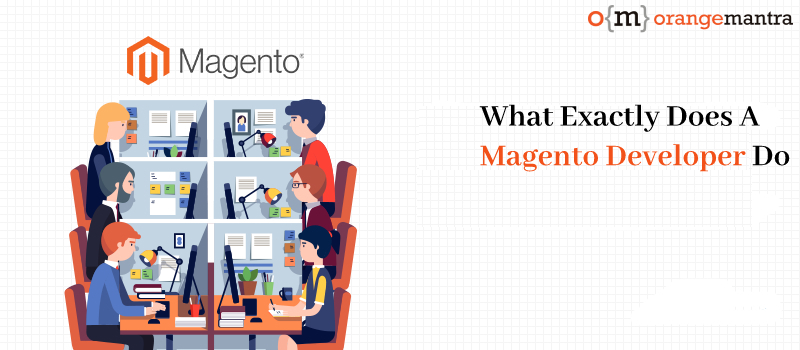E-commerce success is all about the platform you choose to build your online store because it has a far-reaching impact on the look and feel of the websites. In fact, if you have been exploring e-commerce agencies for development, most of them will probably recommend Magento. But do really know what a Magento developer exactly does? How does the role of this professional differ from that of other web developers?
The answer is simple- a Magento developer essentially develop Magento websites but there is a lot more that they do. Before answering this question, you need to understand everything that comes under the umbrella of Magento development.
First things first, what is Magento and how does it work?
To start with, you need to understand what Magento development is. Even before that, you should know the capabilities of this popular e-commerce platform. Magento has emerged as one of the top choices for developers and merchants alike, all because of the host of features it offers. It enables the creation of visually rich, fully-functional e-commerce stores that enable you to sell online. Rather than having to build the core e-commerce features (such as shopping cart, product catalog, and checkout) from the scratch, Magento provides them built-in and all that the developer needs to do is to customize them according to the requirements of the client’s business.
Magento development encompasses a wide range of tasks and an extensive skill set, from the installation and configuration of your Magento store from the scratch, to developing Magento themes and custom features, upgrading your store to the latest version, migrating from another platform optimizing the store’s performance, and more.
What does a Magento developer do?
A Magento developer can be trusted for building, improving, and supporting e-commerce stores. Considering that you want to have a Magento store designed and developed from the scratch, you will require a team comprising expert Magento developers, web designers, testers, and others to fulfill the requirements for all the skills needed. Further, you have the options of hiring a Magento developer who works as a freelancer or one who is a part of Magento agency such as Orange Mantra. Working with both has a distinctive set of advantages, though the latter is more reliable alternative because they are associated with an established agency. However, the choice really depends on individual requirements and preferences.
Based on their skill sets, Magento developers can be segregated into two categories:
- Frontend Magento developers are responsible mainly for the look of the store, building themes that replicate the design that the web designer offers. They make sure that your store looks visually appealing and is responsive as well. The idea is to build one that is capable of grabbing the eye of the visitors and rendering seamlessly across all devices including tablets and smartphones.
- Backend Magento developers, on the other hand, are focused on creating features for your Magento store. They are capable of adding them via bespoke code or using pre-built Magento extensions, as the case may be.
Essentially, Magento developers need to enhance their skills so that they can render multi-faceted stores for their clients. Their experience is equally important as it adds value to their skills. Further, you can also look for certified professionals who have cleared certain certifications to improve their overall skills.
When it comes to listing the typical tasks of a Magento developers, here are the ones they do as a part of the projects:
- Installation and configuration of Magento to create e-commerce stores
- Building Magento themes on the basis of the designs provided to them
- Installation, configuration, and testing of payment gateways such as PayPal, Authorize.net, and SagePay
- Configuration of stores for supporting multi-currency and multi-lingual set ups
- Integration with third-party systems and applications such as customer relationship management (CRM) software, accountancy software, etc.
- Performing audits of Magento stores to determine gaps from the perspectives of speed, security, and search engine optimization
- Optimizing the loading speed and loading time of the Magento stores
- Installing requisite security patches to ensure that the stores are fully secure
- Providing maintenance and support services to ensure seamless running and troubleshoot issues when required
While choosing a Magento developer to work on your project, make sure that they have full-scale expertise and ample experience to handle all these aspects of Magento development from end to end. And if you are looking for a Magento agency, we are a name that you can trust!



